
When parents start looking for early childhood education options, they often wonder: Are daycare and preschool the same? While both provide care and learning opportunities for young children, they have key differences in structure, curriculum, and purpose.
At Kids Castle Daycare, we help parents make informed decisions about their child’s early learning journey. In this blog, we’ll break down the differences between daycare and preschool and guide you in choosing the best option for your child.
While daycare and preschool both offer early childhood education, their primary focus differs.
| Feature | Daycare | Preschool |
| Purpose | Provides care and supervision for children while parents work | Focuses on early education and school readiness |
| Operating Hours | Full-day care, often year-round | Typically part-time, follows a school calendar |
| Learning Approach | Play-based with flexible learning activities | Structured curriculum with a focus on academics |
| Age Group | Infants to pre-kindergarten (0-5 years) | Generally, for children aged 2-5 years |
| Teacher Qualifications | Trained caregivers, may not require teaching degrees | Certified early childhood educators |
Age is one of the key factors that differentiate daycare from preschool.
| Program | Age Group | Focus Area |
| Infant Daycare | 0-12 months | Care, bonding, and sensory activities |
| Toddler Daycare | 1-3 years | Basic social skills and play-based learning |
| Preschool | 3-5 years | Early academic skills and structured learning |
| Pre-Kindergarten | 4-5 years | Kindergarten preparation, cognitive skills development |
While daycare centers accept children as young as six weeks old, preschools generally require children to be at least three years old and potty-trained before enrollment.
Both daycare and preschool have advantages, but preschool offers structured academic preparation that helps children transition smoothly into kindergarten.
✔ School Readiness – Preschool prepares children with basic reading, writing, and math skills.
✔ Structured Learning – Lessons follow a set curriculum with planned activities.
✔ Social Development – More group activities and teamwork-based learning.
✔ Improved Communication Skills – Exposure to structured discussions and vocabulary building.
✔ Higher Academic Performance – Studies show preschoolers perform better in kindergarten.

The answer depends on your child’s needs and your family’s schedule. While both options support child development, preschool offers more structured educational experiences, whereas daycare provides flexibility and extended care hours.
| Development Area | Daycare Benefits | Preschool Benefits |
| Cognitive Growth | Hands-on learning, play-based education | Early exposure to literacy, numbers, and science |
| Social Skills | Interaction with a wide range of age groups | Focused group activities and teamwork |
| Independence | Encourages self-care and responsibility | Teaches structure and following directions |
| Physical Activity | Playtime and movement-based activities | Fine motor and coordination activities |

The curriculum in daycare and preschool differs significantly.
✅ Play-based learning (blocks, toys, puzzles)
✅ Storytelling, music, and movement
✅ Social interaction and emotional development
✅ Basic number and letter recognition
✅ Sensory exploration
✅ Phonics, early math, and science concepts
✅ Writing practice and hands-on worksheets
✅ Group learning and problem-solving activities
✅ Arts, crafts, and creative expression
✅ Early critical thinking exercises
✔ Your child is under three years old and needs full-time care.
✔ You need flexible hours due to work schedules.
✔ Your priority is a safe and nurturing environment over academic learning.
✔ Your child is three to five years old and ready for structured learning.
✔ You want your child to develop academic and social skills before kindergarten.
✔ You have a part-time work schedule or alternative childcare arrangements.

If you’re still unsure, consider these questions:
✔ Is your child emotionally and socially ready for a structured learning setting?
✔ Do you need a full-day or part-time program?
✔ Does your child thrive in play-based learning or academic-based learning?
Kids Castle Daycare, provides both daycare and preschool programs tailored to different age groups, ensuring your child gets the best possible early childhood experience.
Here is a bar chart comparing the benefits of daycare and preschool across key developmental areas: cognitive growth, social skills, independence, and physical activity.

While daycare and preschool may seem similar, they serve different purposes in a child’s early development. Daycare focuses on care and flexible learning, while preschool prepares children for academic success.
Kids Castle Daycare offers daycare and preschool programs designed to support your child’s growth in a safe, nurturing, and engaging environment.
Daycare is ideal for children aged 6 weeks to 3 years, while preschool is best for 3-5-year-old children preparing for kindergarten.
Yes! Daycare offers learning through play-based activities, but preschools follow a more structured academic curriculum.
Preschool isn’t mandatory, but it prepares children for school by improving early math, reading, and social skills.
Yes, but preschool helps bridge the gap by teaching school routines and classroom behavior.
Consider your child’s age, learning needs, and your schedule. If they need full-time care, daycare is better. If they’re ready for structured learning, preschool is a great option.
Looking for the perfect early learning program? Contact Kids Castle Daycare today to learn more!
For more insights on the differences between daycare and preschool, check out this detailed guide by Rasmussen University, which helps parents make the best choice for their child’s early education.